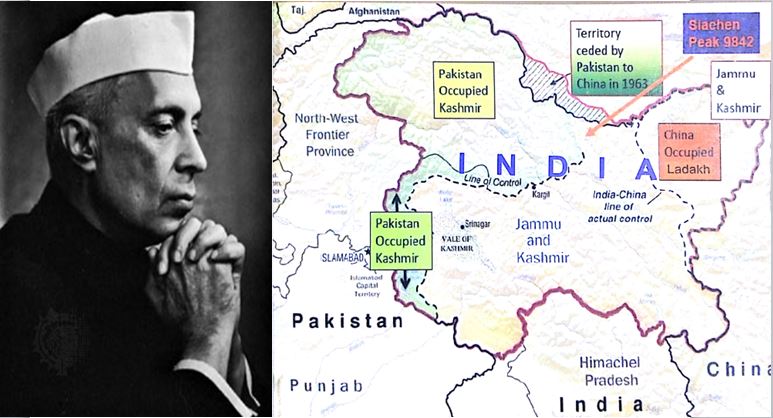There have been many blunders committed during pre and post-independence era of the country. Most of them stay concealed from fellow Indians, especially the younger generation. “PoK” is one such blunder and with this article we will try to dissect of what actually happened on the ground and how did a country which was the aggressor, even after losing the battle and being almost 5 times smaller than us still managed to win a large chunk of land known as Pakistan occupied Kashmir (PoK).
The debate has been brought to the forefront by the statement of the Air force chief, Air Chief Marshal Arup Raha, that PoK would have been India’s had the country gone for a military solution rather than taking a “moral high ground“. In an unusually candid remark, the chief termed PoK a “thorn in our flesh” and said India did not follow a “pragmatic approach” to security needs.
If one revisits history and looks at the sequence of events and actions taken by individuals, they would be amazed to see the kind of stupidity done, well many would still argue that it is all very cool to say this in hindsight today, but frankly the actions and decisions taken were never in the interest of the nation.
Maharaja Hari Singh of J&K after independence and partition was coining the idea of being an independent country free from both India and Pakistan. He was unsure till the last moment. Meanwhile Pakistan made the first move and pushed heavily armed tribal intruders led by Pakistani Generals from across the border to capture the state by force in October 1947. They managed to capture Gilgit-Baltistan, Muzaffarabad and large parts of North West Kashmir. The Maharaja called in his army which comprised of the Dogras and Muslims to defend, but in a major setback the Muslims deserted and joined hands with the Pakistani aggressors. The Dogras led by Brig. Rajinder Singh continued and offered a valiant resistance. The Pakistanis moved past this resistance and had practically managed to capture Uri, Baramulla and were on the outskirts of Srinagar.
Left with no option the Maharaja finally signed the “Instrument of Accession” and New Delhi launched a massive airlift of troops to Srinagar from the early hours of 27th Oct 1947. Home Minister Sardar Patel’s assertiveness ensured that the Indian Army arrived in Srinagar just in the nick of time and in next few days both Uri and Baramulla were re-captured and the intruders were pushed back from Srinagar.
The army was in full momentum and were strategically capturing large tracts of land back, which is when Nehru, the PM attempted to do a self-goal by visiting an enemy country at war with us on 8th Dec 1947.
Ironically even with Indian forces being in the commanding position, Nehru was still pleading his Pakistani counterpart for deescalating the tension, by asking him to appeal the intruders to pull back and as expected the Pakistani PM expressed his helplessness, Nehru returned empty handed causing a great deal of embarrassment not only for himself but also for the nation.
His next step ensured that this time India indeed made a self-goal, he rushed to United Nations in spite of Sardar Patel’s warning.
The Maharaja had already signed the “Instrument of Accession” on 26th Oct 1947 with India, which in itself was an acknowledgement that the state of J&K like any other princely state has agreed to its merger with India.
In an act of over excitement Nehru placed a proposal before the United Nations Organization (UN) on 1st Jan 1948 appealing to declare Pakistan an invader, get the land liberated and also to know people’s opinion in a peaceful atmosphere, which in simple words means plebiscite. To make it heard loudly and clearly, assuming no one heard it in the previous instance, he once again on 2nd Nov 1948 in his All India Radio broadcast assured to hold plebiscite in J&K, though it is a known fact that it is beyond his powers and unconstitutional for him to commit on plebiscite.
This act damaged India’s interest immensely and gave an impression that India was a weak nation and needed the International community to throw the aggressors out of its land. Also apart from internationalizing the issue, the most appalling thing was that the Indian Army was on the verge of pushing all the intruders past its borders in next few days when the political leadership out of sync from its military counterparts announced for a ceasefire resulting in solidifying the fronts which eventually came to be known as Line of control (LoC).
India gained two-third of the state and Pakistan snatched the remaining one-third which is called as PoK.
Paradoxically the same blunder of ceasefire when India again had an upper hand was committed in the Indo-Pak 1965 war.
The Nehruvian establishment’s tradition of burying the truth is still so entrenched that eyebrows are raised even when a serving Chief of our armed forces speaks of what went wrong 70 years ago. Sections of media offloads the topic, activists and liberals look the other way, historians counter its validity and intellectual’s debate with fiction.
